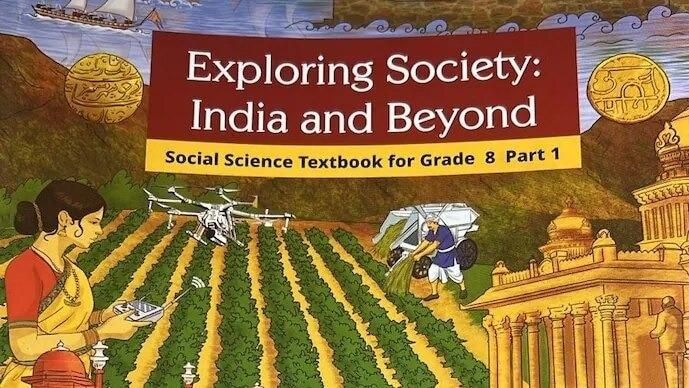NCERT Defends Mughal Content in Class 8 Textbook Amid Controversy
The National Council of Educational Research and Training (NCERT) has stirred debate with recent revisions to its Class 8 social science textbook, particularly in sections focusing on the Mughal period. The updates, part of NCERT’s broader effort to reshape social science education, have sparked questions from parents, educators and students across the country.
So what’s in the textbook? And why has it become such a focal point? Here’s a closer look.
Timeline of the Controversy
- Early 2023: Draft recommendations from the National Curriculum Framework for School Education (NCFSE) propose content restructuring.
- Mid-2023: NCERT adjusts timelines, shifting key topics from Class 7 to Class 8.
- First quarter of 2024: New edition of the Class 8 textbook, Exploring Society: India and Beyond, is launched.
- April 2024: Scholars and educators begin analyzing changes; debates erupt around references to Mughal emperors Babur and Aurangzeb.
- 1 May 2024: NCERT releases an official statement clarifying its position amid growing public attention.
Official Statements from NCERT
Responding to the criticism, NCERT offered detailed reasoning for the revisions. Speaking through a public press release, the council emphasized that the textbook changes were the result of careful examination of “well-known primary and secondary academic sources.”
“This textbook attempts to provide an idea about the geography, history (medieval & modern), economic life and governance of the country, from a multi-disciplinary perspective in an integrated way,” the NCERT stated.
The revised book includes more direct discussions of religious conflict and societal upheaval during the Mughal period. Key highlights include references to Babur being a “brutal and ruthless conqueror” and to Aurangzeb’s destruction of temples and gurdwaras. These points appear in a new section titled “A Note on Some Darker Periods in History.”
The purpose of this section, the NCERT explains, is to present history without bias and to avoid present-day misunderstandings. It signals to students that while violence and oppression did occur, modern societies must learn from them rather than dwell in blame.
“A cautionary note has been inserted in one of the chapters to make it clear that no one should be held responsible today for events of the past,” the agency stated. “The emphasis is on an honest approach to history with a view to drawing from it important lessons for a better future.”
Why Class 8?
Some readers asked why this content isn’t introduced earlier or later. NCERT answered this, saying the shift to Class 8 aligns with the new 2023 NCFSE recommendations. Essentially, Class 8 is viewed as the capstone year of the Middle Stage in Indian schooling, which stretches from Classes 6 to 8.
NCERT outlined its educational philosophy like this:
- Introduce a broad, multi-disciplinary overview of Indian history.
- Avoid overwhelming students with excessive detail.
- Encourage analytical thinking over memorization of dates and events.
In short, Class 8 serves as an educational bridge. It helps students connect past events with the present in a way that prepares them for deeper historical analysis in higher classes.
Shifting Historical Perspectives
It’s also interesting to see how different narratives are being acknowledged. While previous textbooks often glossed over the complexities of certain rulers, the newer material does not flinch from addressing the darker moments. This includes the targeted destruction and aggression under specific rulers, including Babur and Aurangzeb.
Still, the book stops short of sensationalism. It relies heavily on established academic consensus, drawing from both archaeological records and written accounts to guide its narrative. No new historical facts are presented — just a more nuanced telling of old ones.
Community Response
The reaction? Well, it’s layered. While some educationists have welcomed the clarity and honesty, others worry about how young minds interpret these kinds of historical judgments. Parents and teachers wonder whether stronger teacher training is required to handle sensitive discussions in classrooms.
A teacher from a Delhi government school, who asked not to be named, remarked, “The intent seems good, but context is everything. How these histories are taught will matter just as much as what’s in the book.”
Some social media posts expressed concern that the move might lead to prejudice. Others appreciated that the responsibility for past atrocities is not projected onto any contemporary group or identity.
What’s Next?
You might be thinking: where does this all lead? For now, NCERT is standing firm on its decisions. But it’s also inviting feedback—formally and informally. In a country as diverse and complex as India, rewriting textbooks is almost always a painstaking affair. Perhaps rightly so.
Here’s what we might expect in the coming months:
- Further consultations with educators and academic historians.
- Classroom observation of how the new content is taught and received.
- Potential updates in teaching guides and training sessions.
In the end, NCERT says its goal is to help students become critical thinkers who appreciate the intricacies of India’s past. That’s a high bar. But at least, for now, there’s an open call for scrutiny and discussion, which might be a step in the right direction.
Of course, questions will persist. History often invites interpretation, and when it enters the classroom, those interpretations can shape young minds in powerful ways. Getting it right, or even close to right — well, that’s going to take a lot of participation from both educators and families alike.

